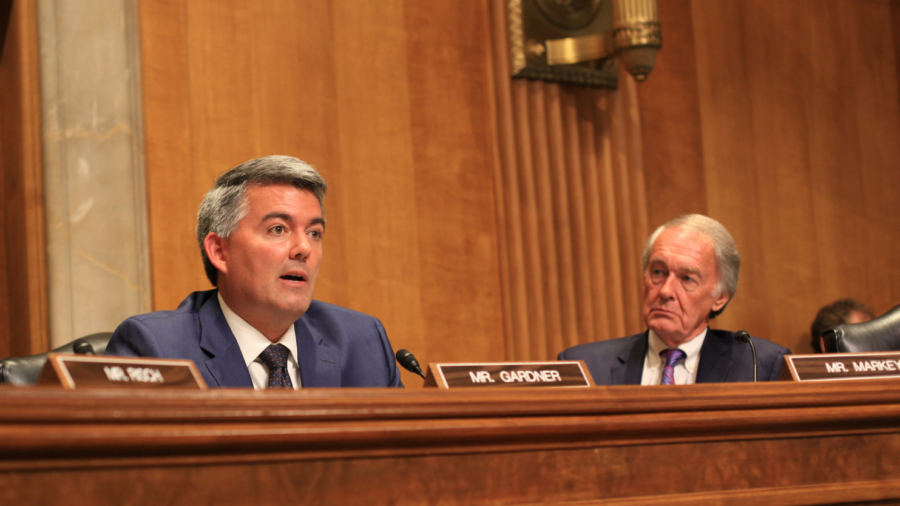WASHINGTON—For decades, U.S.–Sino policy was rooted in the belief that support for China’s rise and its integration into the post-war international world order would liberalize the communist nation. Now U.S. lawmakers are seeing a need to assess options for countering China’s ”less-than-peaceful rise.”
China now wants to shape the world with its authoritarian model, so the United States must examine its policy options “to prevent China’s coercion from undermining the peace and stability in the Indo-Pacific and beyond,” Sen. Cory Gardner (R-Colo.) said during a Senate hearing on “Security and Military Developments” on Sept. 5 that focused on China.
“Countering China’s less-than-peaceful rise represents a great challenge for U.S. national security,“ he said.
According to Oriana Skylar Mastro of the American Enterprise Institute, “The United States needs a whole-government approach to ensure that we are accurately and completely identifying what China is doing across domains.”
She said a Defense Department annual report to Congress on Chinese security and military developments alone isn’t enough. She suggested that a USAID report on Chinese foreign aid, a State Department report on China’s diplomatic efforts, and a Commerce Department report on its growing economic clout are also needed.
“China’s rise is already changing the balance of power in the Indo-Pacific, and will have profound implications for the future of the liberal international order,” said Abraham M. Denmark, director of the Asia Program at the Woodrow Wilson International Center for Scholars.
He agrees with the current administration’s explicit recognition of the great power competition that is currently underway between China and the United States.
“Military issues play a significant role in that competition—the United States will not be able to sustain a ‘Free and Open Indo-Pacific’ unless it accounts for the challenges posed by an increasingly capable People’s Liberation Army,” he said.
“Within our $700 billion defense budget, we are going to have the ability to out-compete with China,” Denmark said. “But it will require for the U. S. to prioritize investment, especially tailored to the China challenge, prior to funds going elsewhere. “
Denmark noted that the China challenge isn’t just a military question; trade also has geopolitical effects. Many countries in Asia see China as a source of economic opportunity, and the United States as a source for security. These countries don’t want to be forced to choose between China and the United States.
Taiwan was one of the focal points at the Q&A session.
Asked about China’s ultimate goal toward Taiwan, both Denmark and Mastro said that the ultimate goal is reunification that is ideally by peaceful means. But the bottom line is that China is willing to use force if it has to. Chinese President Xi Jinping promised the Chinese people that the reunification should be achieved by 2035.
Congress has begun looking for ways to respond to Chinese aggression.

On Sept. 3, Gardner, along with Sen. Ed Markey (D-Mass.), Sen. Marco Rubio (R-Fla.), and Se, Bob Menendez (D-N.J.) introduced the Taiwan Allies International Protection and Enhancement Initiative (TAIPEI) to strengthen Taiwan’s standing around the world. This comes in response to several nations breaking official diplomatic ties with Taiwan, due to Chinese pressure and bullying tactics.
The TAIPEI Act requires a U.S. strategy to engage with governments around the world to support Taiwan’s diplomatic recognition or strengthening unofficial ties with Taiwan.
Additionally, it authorizes the State Department to downgrade U.S. relations with any government, as well as suspend or alter U.S. foreign assistance, including military financing, to nations that take adverse actions with regard to Taiwan.
In April 2018, a bipartisan effort in Congress saw the introduction of the Asia Reassurance Initiative Act (ARIA) aimed at reassuring allies, deterring adversaries and securing U.S. regional leadership. Gardner sponsored the measure, which will “set a new course for U.S. policy for the Indo-Pacific, including significantly boosting U.S. security presence in the region,” he said.
From The Epoch Times

